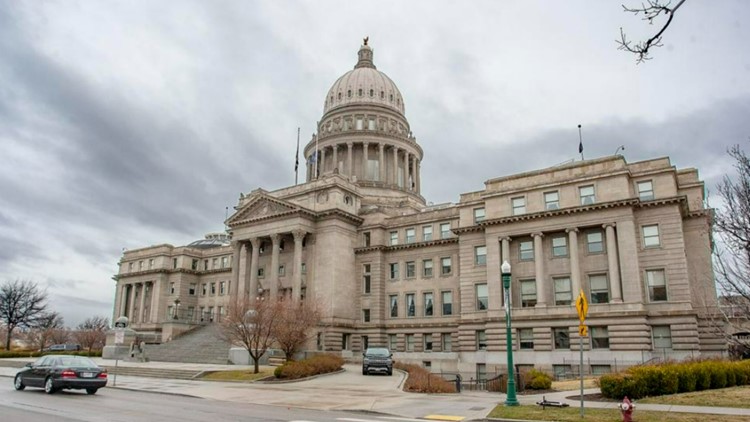BOISE, Idaho — This article originally appeared in the Idaho Press.
In the waning days of the 2024 legislative session, a Senate committee held hearings Friday on two bills that opponents say target and discriminate against LGTBQ people, especially transgender and nonbinary Idahoans.
The Senate State Affairs Committee narrowly passed HB 421 and HB 538, which amend definitions of male and female, and prohibit repercussions for state employees and teachers for misgendering or misnaming transgender coworkers and students.
Both bills had overwhelming opposition from those who came to testify, many of whom spoke during both hearings, and each bill passed in 5-4 votes.
Gender and sex definitions
HB 421 would amend the definitions of male and female across state code. The legislative intent in the bill says that, “in human beings, there are two, and only two sexes: male and female” and that “in no case is an individual’s sex determined by stipulation or self-identification.” The bill ties definitions of male and female to reproductive functions.
Bill sponsor Sen. Ben Adams, R-Nampa, said the bill was meant as a “clean-up” of code definitions.
Many people who spoke against the bill said its definitions erased the experiences of transgender and nonbinary Idahoans, and others said it would put the state at the center of costly litigation over discrimination of gender identity.
“I urge you to consider the human cost of this bill,” said Mistie DelliCarpini-Tolman, Idaho state director with Planned Parenthood Alliance Advocates.
Nikson Mathews noted that at the public hearing in the House, everyone who testified was opposed to it but it still passed. Mathews, who is a trans man, said that these types of debates and bills negatively impact everyone, underscoring incidents where female athletes had their genders questioned or women with short hair being confronted in women’s bathrooms.
“This is happening in places where bills like 421 are being passed. It creates a more unsafe space for my community but it creates u more unsafe space for women," Mathews said. "Are we could to start requiring sex verification? .... It benefits nobody, it’s not a matter of simplicity. The science does not support this.”
Grace Howat, of the Idaho Family Policy Center, supported the bill. She said progressive people were “waging a war on longstanding legal meanings” in regards to sex and gender, and argued the bill will protect the ability to have separate sex facilities for women’s shelters, sports, bathrooms, or "sex-appropriate work uniforms."
Jessica Rolynn, a Pocatello-based family medicine physcian, opposed the bill and said its definitions in it don’t align with commonly held medical or scientific definitions of sex and gender.
“I have been studying human biology for the past 14 years, there is absolutely no such thing as a binary in sex or gender,” Rolynn said.
Sens. Treg Bernt, R-Meridian, and Abby Lee, R-Fruitland, said they worried the bill would result in costly litigation, as other bills that mostly target transgender people have.
“I think as we look over the past several years, we know exactly where this is headed,” Lee said.
She also argued that the Constitution is designed to protect the minority, and these types of bills affect a “vulnerable, marginalized already, small number of individuals who would be harmed.”
“I think that should matter to us,” she said.
Pronouns
Sen. Chris Trakel, R-Caldwell, sponsored HB 538, which would prevent retribution for public employees, including teachers, who refuse to use someone’s preferred pronoun, name or title if it doesn’t correspond to their biological sex.
The bill also requires employees to not address unemancipated minors “by a name other than the student’s legal name or derivative thereof, or preferred personal title or pronoun that is inconsistent with the student’s sex, without written permission of the student’s parent or guardian.”
Trakel said he saw it as a freedom of speech issue. He said it protects people who have religious beliefs that wouldn’t acknowledge someone’s gender identity.
"This is simply allowing them to be able to stick with their personal beliefs, their religious beliefs, whatever so beliefs they may so be," without facing retribution.
Wintrow asked if under the bill, if she as a state employee continued to call him “Mrs. Trakel,” if she would not be allowed to have consequences.
Trakel responded, “I would find that disrespectful, but that’s your right.”
Katherine Harley, head of the Idaho Office for the Pacific Justice Institute, testified in favor of the bill. The Pacific Justice Institute is a nonprofit that focuses on religious freedom and parental rights, including “resources to help promote evangelism within the public schools,” according to its website.
She said that compelling employees to use someone’s preferred pronouns is a violation of First Amendment rights.
The Idaho Family Policy Center also spoke in favor of this bill.
Nissa Nagel spoke in opposition to the bill because if she asked her child’s teachers to use the student’s preferred name and pronouns, the teacher may still refuse.
"Then the deadname and gender would be circulating in the school environment thereby outing my child and exposing them to bullying and potentially violence," Nagel said. "This would me my parental rights and my child their right to privacy."
Amy Dundon, of the American Civil Liberties Union of Idaho, argued the bill would violate constitutional rights and federal anti-discrimination protections.
"Beyond the many legal problems with HB 538, of course the human cost of the bill would be devastating," Dundon said. "Transgender people live in Idaho work, they call Idaho home. By creating exclusionary public work and school environments, this state is subjecting them to predictable and dire harm."
Stephen Bender, a substitute teacher in Ada County, said he was in support of the bill because he argued that some of his students want to be referred to by another gender or name as a “fad” or to rebel against their parents.
Trakel responded to a testifier who said the bill is a "bully," and argued that those who don't use preferred pronouns because of religious beliefs are also being bullied.
"Bullying is on both sides," Trakel said.
Mary Shea, who was serving as a substitute for Sen. James Ruchti, D-Pocatello, is a civil rights lawyer and said that work and school environments are covered under Title VII and Title IX of the Civil Rights Act. She said that a previous a U.S. Supreme Court ruling affirming findings that deliberate misgendering is a form of creating a hostile work environment.
“So my concern again, just like with the previous bill, is that Idaho passing this bill is inviting more litigation because we are encouraging intentional misgendering," Shea said. "... we are encouraging people to create hostile work environments and hostile school environments. That’s illegal.”
Both bills have already passed the House and now head to the Senate floor for a vote.
Friday had originally been named by legislative leaders as the likely end to the session, but lawmakers can’t go home for good until all the budgets are passed. The House and Senate are scheduled to return to business on Tuesday.
This article originally appeared in the Idaho Press, read more on IdahoPress.com.
Watch more Idaho politics:
See all of our latest political coverage in our YouTube playlist:
HERE ARE MORE WAYS TO GET NEWS FROM KTVB:
Download the KTVB News Mobile App
Apple iOS: Click here to download
Google Play: Click here to download
Watch news reports for FREE on YouTube: KTVB YouTube channel
Stream Live for FREE on ROKU: Add the channel from the ROKU store or by searching 'KTVB'.
Stream Live for FREE on FIRE TV: Search ‘KTVB’ and click ‘Get’ to download.



